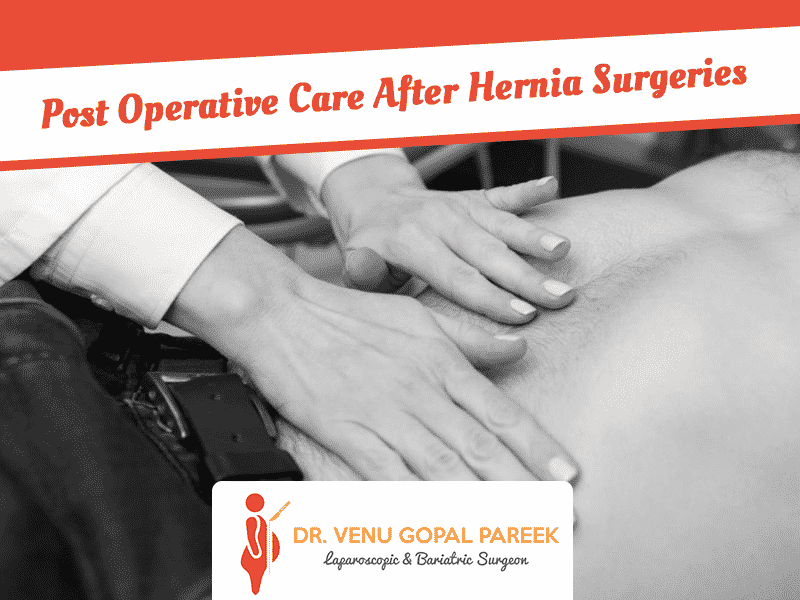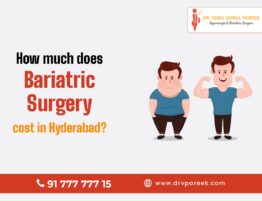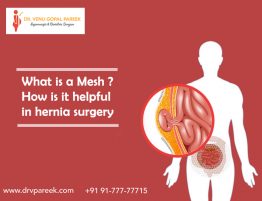
Patients who undergo surgery for a hernia repair have questions and concerns about what to expect after their surgery. Dr Venu Gopal Pareek provides the article with information that helps patients understand what to expect after discharge from the hospital and includes instructions that can help them recover quickly.
Post-operative instructions contain information about nutrition, wound care, treatment, physical activity, and other problems that should take care of hernia recovery. Following these guidelines can help patients recover from surgery as soon as possible and reduce the risk of complications.
Before that, let us know:
Surgery Overview:

Hernia repair with laparoscopic is similar to other laparoscopic procedures. Performed under general anaesthesia and a small incision is made at or just below the navel. The stomach gets inflated with air so the surgeon can see the abdominal organs clearly on screen.
A thin band of light called a laparoscope inserted through the incision. A hernia repair tool inserted through another small incision in the lower abdomen. The mesh is then placed over the defect to strengthen the abdominal wall.
Hernia laparoscopic procedure is different from open surgery in the following ways:
- Laparoscopic repair requires several small incisions instead of one large cut.
- Simultaneously both hernias can be repaired if there are two herniae without the need for a second surgery.
- Laparoscopic surgery allows the surgeon to examine the groin area and all hernia sites to see any damage. Also, the patch of a mesh can be applied to all possible areas of weaknesses to prevent hernias from recurring in the same place or developing in different places.
- General anaesthesia may be required for laparoscopic surgery. Open inguinal hernias can restore with general anaesthesia, spinal anaesthesia, or local anaesthesia.
What To Expect?
- The recovery time after surgery depends on the type of your hernia and the type of surgery needed. Patients who undergo minimally invasive surgery can usually go home the same day and walk the night of the operation. Some patients, especially those who have undergone abdominal wall reconstruction or component separation, may need to be hospitalized for several days.
- Most people who need a laparoscopic hernia healing operation can go home the same day. Recovery time is around 1 to 2 weeks.
- You may be able to return to mild activity in 1 to 2 weeks. Heavy exercise must wait up to 4 weeks for recovery.
Post-Operative Care:

Immediately After Surgery: Patients are brought to the monitor room after surgery to monitor them closely until they are stable. After that, patients discharged on the same day or next day depends upon patients recovery. However, it is best to have a family member or friend with you for several days.
Pain at the incision site: Some patients may experience pain in the incision area, mainly when open surgical methods used for surgery. Swelling and discolouration can appear and disappear during treatment. Painkillers will be given to you by a doctor as pain and swelling often occur and can last 24-48 hours.
Incision site gets covered with a steristrip, which is usually within a week to 10 days. The wound must remain dry because this will allow full healing.
Wound Care:

- It is good to start bathing about 36 hours after surgery. If there is gauze on incisions, remove them before bathing.
- You might see small pieces of tape (called sterile tapes) attached directly to your skin and is okay, to wet this small strip with water. This strips will begin to peel 7-10 days after surgery. At this point, they have done their job, and it is a good idea to peel them all the way if you want. You don’t have to keep them until the post-operative visit.
- After surgery, no bathing, swimming or whirlpool for two weeks.
- Doctor try to close your wound to leave the scar as small as possible. Do not put ointments or other medicines over the wound. It will not treat you better.
- A slight increase in body temperature can last a day or more after surgery, regardless of the type of anaesthesia used. It’s normal. Patients must take a shower at least every day after surgery. Clean water in the bathroom will not damage the wound with infection.
- There may be bruising and hardness or a feeling of rope under the incision. Also, swelling and bruising can occur in the genital area. All this will disappear over time, and the patient needs to be convinced.
- After laparoscopic repair, the patient may feel that the hernia is still present, but this feeling also improves with time. Scrotal oedema can be a problem regardless of the type of repair, especially if the hernia is large or inguinal-scrotal, and again the patient needs to be convinced. When the swelling increases, seroma should be considered that may need to be aspirated and contact with a surgeon recommended.
Medications:

- A doctor prescribes pain relievers. It is essential to take it as directed to keep your pain under control.
- A narcotic pain reliever can make you sleepy and dizzy while using these drugs, you should not drive your vehicle and should not drink alcohol (if you drink it).
- Medications can also cause nausea in some people. Therefore it is best to take them with food.
- Some people may feel itchy with drugs. Unless you have a rash, this is not an allergic reaction, only a side effect.
- Regular Prescription Medicines You can start retaking routine medications immediately after surgery unless your surgeon determines otherwise.
- If doctors prescribe antibiotics, use as directed.
Resuming Of Activity After Hernia Surgery:

- Laparoscopic hernia repair allows patients to return to their routine more quickly. Some people can work again in a few days. Recovery after conventional surgery takes a little longer because the wound has large incisions and pains.
- Usually, patients can get guided by the level of discomfort they experience. Activities such as driving that cause pain and tension should avoid until they can tolerate comfortably. The same applies to work. People with desk jobs can usually return to work within one or two weeks. People whose posts require a lot of exercises or weight lifting may need to wait for several more weeks before they can work again.
Straining during bowel movements also carries tension on the incision site. Therefore, patients need to consume lots of fibre and drink lots of fluids to avoid constipation. Your doctor can prescribe stool softeners.
Most doctors ask their patients to come back for a checkup for about a week. At this point, all stitches are removed or may dissolve by itself.
Driving:

You can usually drive if you don’t take narcotic pain relievers for two days. Drive if you feel comfortable.
Diet :
There are no special dietary restrictions needed to improve your hernia after surgery. Some patients may find that their appetite is terrible for one or two weeks after surgery. It is a natural consequence. If you are stubborn or can’t drink fluids, contact the doctor and let them know.
- You can continue your healthy diet without any restrictions
- Set your food as you tolerate. Start with small meals (not greasy, not spicy) in small portions that can easily digest during the first 2-3 days.
- Drink plenty of fluids (> 2 litres per day) so that you are well hydrated during your body’s regeneration (juice, water, broth, sports drinks).
- Surgery and pain relief can slow the intestines and cause constipation. Start the day before surgery with a stool softener tablets prescribed by a doctor.
- If you remain without defecation for more than 2-3 days, you should talk with the doctor who can prescribe medication. Use them until your first bowel movement starts.
Bowel Movements:

- The first bowel movement can occur between 1 and 5 days after surgery; As long as you don’t get sick or have an upset stomach, can accept this change
- Remember, it is widespread for your rectum to release more gas than the usual it is because you are on bed rest.
- Some patients also find that they experience diarrhoea or loose bowel movements in the first few days after the hernia becomes normal. In most cases, the intestinal function becomes routine over time.
- Constipation also can be common because of painkillers.
- Doctors recommend you take medications while taking pain relievers to avoid constipation.
Seroma:

Some patients find that hernias recur after surgery. Don’t worry; this is a normal feeling or appearance. Hernia surgery does not fail but, the location where the contents of the hernia formed can sometimes get filled with post-operative fluid this fluid is the result of the operation, and the body usually reabsorbs it after a few weeks.
Infection:
Luckily, this is unusual. Most wounds hurt after surgery, and no antibiotics are needed. Many surgeons can give a single right dose of antibiotics to minimize the chance of infection.
Post-operative Restrictions:
After surgery, most patients advised not to lift more than 15 pounds for the first two weeks, although more complex patients may have other limitations. Different patients have individual restrictions, but in general, you must be as active as your provider allows. If you have questions or problems after surgery, contact your doctor immediately.
When To Call A Doctor:
Call a doctor or surgeon if any of the following occurs:
- Fever to 100.4 or greater
- Shaking chills
- Pain that increases over time
- Redness, warmth, or pus draining from incision sites
- Persistent nausea or inability to take in liquids
Conclusion:
All patients must come for follow up two weeks after surgery to ensure that their pain is well controlled and free from infection. For patients with more complex procedures, pressure bandages may need to be examined and ensure that all surgical drainage is removed properly to avoid further infection. Depending on the patient’s progress, a second follow-up id required.
A follow-up visit to make a follow-up appointment, contact the doctor and make an appointment with your surgeon in 10-14 days.
If you have any problems with a hernia and looking for the best surgical options and if
you have concerns about your surgery or recovery, contact Dr Venu Gopal Pareek at +91 91-777-77715.







